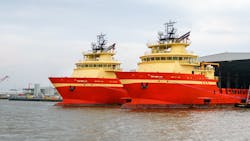API: Analysis finds that proposed Gulf of Mexico restrictions diminish energy security
Offshore staff
WASHINGTON, DC – The American Petroleum Institute (API) has released a new analysis that outlines the potential consequences of new vessel restrictions on American oil and gas workers in the US Gulf of Mexico.
The study, conducted by EIAP, finds that recently proposed restrictions on oil and natural gas vessels operating in the Gulf of Mexico would have a major negative impact on jobs, industry investment, government revenue and oil and natural gas production in the region, to a nearly one-quarter decline – which is more than 500,000 barrels of oil equivalent per day – in energy production in the Gulf of Mexico by 2040 even as demand continues to rise.
The analysis was submitted to the National Marine Fisheries Service (NMFS) alongside joint comments from API, EnerGeo Alliance, the Independent Petroleum Association of America (IPAA) and the National Ocean Industries Association (NOIA) in response to the federal government’s proposal to designate Rice’s whale critical habitat in the Gulf of Mexico.
In the comments, the associations highlighted the industry’s commitment to environmental stewardship and habitat conservation in the areas in which they operate but argued that the proposal is not supported by the best available science, lacks a comprehensive evaluation of known economic costs, and fails to comply with the Endangered Species Act.
As argued in its successful motion for preliminary injunction on unjustified restrictions to Lease Sale 261, the API says that there is insufficient information to warrant a far-reaching ban on vessel operations after extensive data collections. The analysis found that the recommended restrictions would severely impact the industry’s ability to supply the necessary materials to conduct oil and natural gas development in the Gulf.
According to the new analysis, if the vessel restrictions are implemented:
* Average oil and natural gas production is projected to decline to just under 2 million barrels of oil equivalent per day, a 24% reduction from projected levels, between 2023-2040.
* Average oil and natural gas industry employment supported by Gulf of Mexico activities is projected to fall by 13% to just under 310,000 jobs nationally.
* Industry investment in the US Gulf of Mexico is expected to decline by 14% from 2023-2040. In 2024 alone, industry investment in the region declines by approximately $6.8 billion, a 19% reduction.
* Government revenue from oil and natural gas production is projected to fall by 22% to $5.7 billion annually.
10.06.2023
